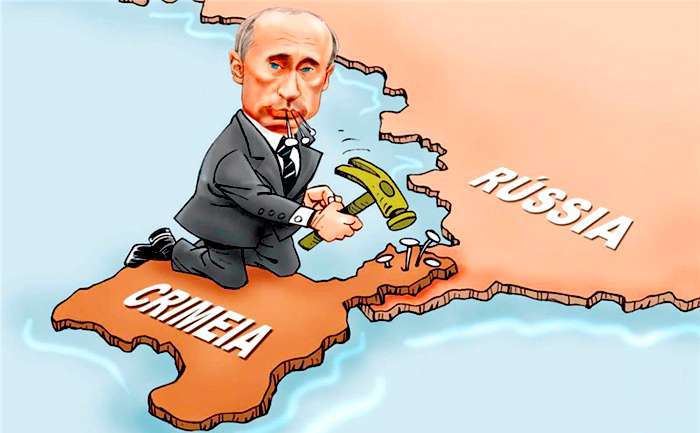New Russian law proposes 10-year sentence for seeking return of Crimea to Ukraine

A week after a fake referendum was used to push through changes to Russia’s Constitution, a draft bill has been introduced aimed at criminalizing any suggestion that Russia should return annexed Crimea to Ukraine. The changes propose a possible prison sentence of up to 10 years for actions aimed only at complying with the United Nations and all international bodies.
Although it was widely understood that Russian President Vladimir Putin had initiated the constitutional changes to enable him to remain in office for at least another 10 years, a second objective was clearly to try to block any attempts to end Russia’s illegal occupation of Crimea.
As reported, one of the authors of the constitutional amendments, Andrei Klishas, made no attempt to conceal this motive. In an interview a week before the vote, Klishas, who is also a Russian senator, said that one of the amendments would block any actions or legislative initiatives on the return of Crimea to Ukraine.
The new wording of the Constitution adds the following: “The Russian Federation ensures protection of its sovereignty and territorial integrity. Actions (excluding delimitation; demarcation and re-demarcation of the state border of the Russian Federation with bordering states) aimed at excluding a part of the Russian Federation’s territory, as well as calls to such actions, are not permitted”.
Klishas claimed that this was not aimed at pursuing bloggers or others who write things on social media like “let’s give Crimea back”.
Experience of the past six years made that denial less than convincing, and the draft bill which Klishas, together with the head of the profile Duma committee, Pavel Krashennikov, tabled on 8 July only confirms that scepticism was warranted. The new draft bill proposes to amend Russia’s notorious ‘law on countering extremism’ by rewording one of the alleged demonstrations of ‘extremism’ Instead of merely ‘violation of Russia’s integrity’, this will read: “violation of the Russian Federation’s territorial integrity (including through exclusion of a part of the RF’s territory) with the exception of delimitation; demarcation and re-demarcation of the state border of the Russian Federation with bordering states.’
Krashennikov claims that this is simply bringing the law’s terminology into line with the constitutional amendments and avoid vague or ambiguous interpretation of ‘integrity’. They are, however, going much further. Since the Constitution now prohibits ‘exclusion of a part of the Russian Federation’s territory’, they propose to add a new Article 280.2 of the criminal code which would consider any initiative aimed at complying with international law by returning Crimea to be ‘extremism’.
Article 280.1, which punishes for something termed “public calls to carry out actions aimed at violating the territorial integrity of the Russian Federation via the mass media”, was added to the criminal code in May 2014. Fears then that it would be used against people who stated, as do all international bodies and democratic states, that Crimea is a part of Ukraine have already proven well-founded, with several real or suspended sentences already passed against Ukrainians or Russian citizens.
Now the proposal is to slightly mellow the ‘punishment’ for following international law, by allowing for a first administrative prosecution, with a person only subjected to criminal charges if s/he commits the so-called ‘offence’ a second time within a year. At present, criminal charges can be and have been brought over a single interview or social media posts. The sentence will then range from a fine (between a huge 200 - 400 thousand roubles) to a prison sentence of up to four years with a ban on holding particular posts or carrying out particular activities.
Article 280.2 ‘Violation of the territorial integrity of the Russian Federation’ could result in a sentence of from six to ten years’ imprisonment.
What exactly is meant by such a norm is unclear, but then that is true of most of Russia’s legislation on so-called ‘extremism’. Very many people, including politicians, will feel loath to test for themselves whether this will include speaking openly about Russia’s illegal occupation of Crimea or proposing legislation to return the peninsula to Ukraine.
The new wording, like that of the Constitution, does in principle cover any legitimate Russian territory or territory illegally occupied, however few would doubt that this is yet another attempt to criminalize anybody who casts in doubt that “Crimea is ours”.
This is an act of hostility against Ukraine and against the international community, and one that seems ultimately doomed. A person who has stolen somebody’s Mercedes and then forges ownership documents does not, by doing so, become the owner, and this is essentially what Russia is doing. It was in breach of international law when it invaded and annexed Crimea and remains so now, however much it may rig ‘referendums’ to readjust, post-fact, its maps or Constitution.





